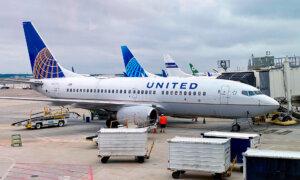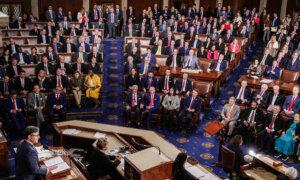The FAA now has investments to increase safety, hire thousands of needed air traffic controllers, and improve airport infrastructure nationwide.
President Joe Biden signed the five-year, bipartisan Federal Aviation Administration (FAA) reauthorization bill on May 16, concluding weeks of congressional negotiations over an industry beset with staffing shortages and safety issues.
The legislation improves FAA safety standards to avoid near-collisions on airport runways, makes it easier for customers to request and receive refunds for delayed or canceled flights, and adds five new daily roundtrip flights to Ronald Reagan Washington National Airport in the District of Columbia.
The addition of flights at Reagan National proved controversial. Both Virginia senators sought to block a vote on the full bill without first hearing their amendment to remove the flights; they argued that more flights would simply lead to another near-collision on the airport’s runway such as the one on April 18.
President Biden lauded the reforms in a statement after signing the bill and noted the cash refund rule implemented by the Department of Transportation.
“The bipartisan Federal Aviation Administration reauthorization is a big win for travelers, the aviation workforce, and our economy,” he said.
“It also builds on my Administration’s efforts to improve the travel experience for airline passengers, affirming the Department of Transportation’s rule that mandated automatic refunds when flights are canceled or significantly delayed.”
Following an increase in consumer complaints and requests for refunds after airlines canceled flights during the COVID-19 pandemic, the Biden administration proposed a refund rule change in 2022. With the new rule, passengers are entitled to automatic cash refunds if they decline a rebooking request after their flight is canceled or if their domestic flight is delayed by three hours or their international flight by six hours.
Other reforms in the bill target the FAA staffing shortage, pushing the agency to set maximum hiring targets to address a deficit of more than 3,000 air traffic controllers. The agency will deploy new situational awareness technology at airports to prevent near-collisions and other incidents on busy runways.
The investments include $66.7 billion for FAA safety programs, such as hiring new air traffic controllers and technical engineers. There is also $17.8 billion to modernize agency facilities and equipment, another $19.35 billion to improve airport infrastructure nationwide, $1.59 billion for research, engineering, and development to keep the country competitive in the aerospace industry, and $738 million for the National Transportation Safety Board.
“I believe the FAA Reauthorization Act of 2024 is one of the farthest-reaching, most consequential pieces of legislation that the House will consider in the 118 Congress,” Rep. Sam Graves (R-Mo.) said on the House floor on May 14.
Mr. Graves was one of the four bipartisan lawmakers who negotiated the bill in April, along with Rep. Rick Larsen (D-Wash.), Sen. Maria Cantwell (D-Wash.), and Sen. Ted Cruz (R-Texas).
Rep. Garret Graves (R-La.) also supported the bill in a May 14 speech on the House floor.
“This bill will bring the FAA out of the 20th century and allow us to lead it globally in the 2030s and beyond,” he said.
The president signed a one-week extension of FAA programs on May 8 after the House approved it to give Senate leaders additional time to advance the legislation without having to furlough thousands of agency employees.
Original News Source Link – Epoch Times
Running For Office? Conservative Campaign Consulting – Election Day Strategies!


